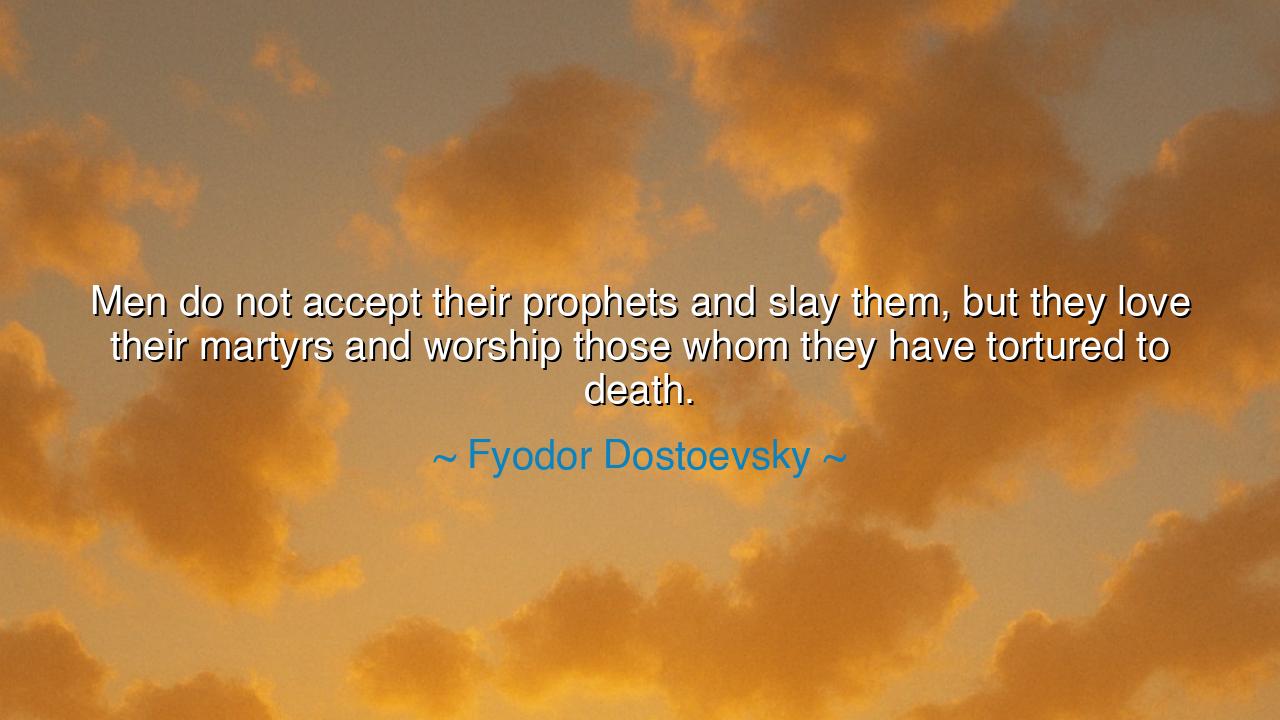
Men do not accept their prophets and slay them, but they love
Men do not accept their prophets and slay them, but they love their martyrs and worship those whom they have tortured to death.






“Men do not accept their prophets and slay them, but they love their martyrs and worship those whom they have tortured to death.” Thus wrote Fyodor Dostoevsky, the Russian prophet of the human soul, whose pen cut deep into the contradictions of mankind. In this piercing declaration, he reveals one of the oldest and most tragic truths of human nature—that truth is seldom welcomed while it is alive, and those who bear it are often destroyed by the very people they seek to enlighten. Men reject the prophet because he confronts their illusions; they destroy him because his light exposes their shadows. Yet, once he is dead and his voice silenced, they build altars in his memory and call him martyr. For it is easier to worship a saint than to listen to a living conscience.
Dostoevsky spoke from a lifetime of suffering and observation. Exiled to Siberia, stripped of freedom, and marked by near execution, he saw firsthand the cruelty of systems and the weakness of hearts. He knew that truth is not only a sword but a fire—and most men fear the burn. The prophet, who dares to speak truth in its raw, unsoftened form, is too intense for a world that clings to comfort and hypocrisy. So they silence him. But once his blood is spilled, his message becomes safe, his fire reduced to a candle. The same people who shunned him now find courage to honor him, for death transforms rebellion into legend and converts discomfort into admiration. Thus, humanity repeats its endless cycle: rejection, destruction, veneration.
This pattern is as old as civilization itself. Consider Socrates, who drank the hemlock because Athens could not bear his questions. His words cut too sharply through pride and illusion. Yet centuries later, he is remembered as the father of philosophy. The city that killed him now honors him in its very identity. Or think of Galileo, condemned for daring to say that the earth moves around the sun—a truth too vast for the minds of his age. The Church silenced him, yet today, his name is a monument to reason and discovery. Dostoevsky’s wisdom shines through these examples: humanity kills its prophets when they are inconvenient, and only later, when time has tamed their message, do they kneel before their memory.
But no figure embodies this paradox more than Jesus of Nazareth, the most profound example of Dostoevsky’s insight. In his lifetime, he was despised by the powerful and rejected by the many. His words of mercy and justice threatened the thrones of men, so they nailed him to the cross. Yet, in death, he became the symbol of love and redemption for billions. The same crowd that once cried, “Crucify him,” would later call him Savior. Dostoevsky, a devout believer and seeker of redemption himself, saw in this the greatest irony and the greatest truth: that the human heart fears holiness even as it longs for it. We destroy the living truth because it judges us, but we worship its memory because it redeems us from guilt.
The origin of this quote rests in Dostoevsky’s lifelong meditation on moral struggle. He believed that humanity is forever torn between pride and repentance. The living prophet awakens the former; the dead martyr soothes the latter. To listen to the prophet requires courage—to change, to be humbled, to face the truth about oneself. But to worship the martyr requires only sentiment, not transformation. Thus, men find comfort in honoring what is gone rather than obeying what is alive. This is why the voices that challenge the present are always met with scorn, while the same words, uttered by the dead, are received as sacred wisdom.
In this, Dostoevsky gives us both warning and hope. He reminds us that truth must not be loved only after it has suffered, nor should we wait for the voices of courage to fall silent before we heed them. The measure of a society is not how it mourns its heroes, but how it treats them while they live. If we wish to progress, we must learn to recognize the prophet in our midst—to listen to those who speak with conviction, even when their words unsettle our peace. For the prophet’s task is not to please but to awaken, and the one who awakens us from our delusions deserves our gratitude, not our wrath.
So, my child, take this teaching to heart: do not wait until the truth is safe before you honor it. When you meet a voice that challenges your comfort, pause before you reject it. Ask yourself if it burns because it is false—or because it is true. Learn from the courage of the prophet while he still walks among you, lest you later kneel beside his grave in vain remorse. History’s great mistake is to silence its teachers and sanctify their tombs. But the wise will break this cycle—they will listen to the living, honor the truth while it breathes, and thus build a world where prophets need not become martyrs to be heard.






AAdministratorAdministrator
Welcome, honored guests. Please leave a comment, we will respond soon